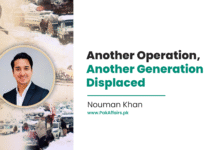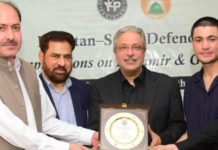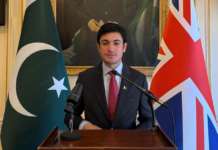China and Russia are often identified as the two key sources of external pressure in contemporary Western political debates about the decline of the liberal international order. Within the core liberal democracies, the primary foundations of internal pressure are widening social disparity, mass immigration, voter skepticism, and growing national populism.
The People’s Republic of China is frequently portrayed as an authoritarian state seeking to transform the global order, with which it is strongly integrated from the inside, as a growing superpower exposing a successful growth model that rejects liberal democracy.
The Russian Federation, on the other hand, is commonly depicted as a failing great power (but a nuclear superpower) whose authoritarian system serves as a last resort and aims to partially undermine the US-led order from the outside. While the former has reaped major benefits from the end of the Cold War, the latter has been by far the biggest loser. Such depictions properly reflect reality and support the view that Moscow’s international behavior is mostly reactive to Western acts, whether through the 2008 Russo-Georgian War, the 2014 annexation of Crimea, or the 2022 invasion of Ukraine.
This argues that Putin’s conflict in Ukraine cannot be viewed solely as a retaliatory response to geopolitical causes. That is, while concrete security concerns have fuelled Russia’s military actions in former Soviet space, including the present conflict in Ukraine, such reasons interact with a set of values that shape the ‘superstructure’ of Russian leadership in Moscow. This will be accomplished by identifying the major ideological and ideational influences on Vladimir Putin’s geopolitical view of Ukraine. Furthermore, because of its inherent absurdity, the ‘denazification argument’ does not require or justify any serious examination.
Although structural realists see Vladimir Putin as a power maximizer whose foreign policy ultimately seeks to ensure Russia’s survival, essentially black-boxing domestic variables, such analyses fail to account for the ideas that have influenced and been mobilized by the Russian President in pursuit of hard geopolitical objectives. Putin is a power maximizer who moves to preserve the survival – and extension – of the Russian state, but those goals, however pragmatically pursued, are not defined in an intellectual vacuum. Rather, as neoclassical realists argue, external systemic stimuli are inwardly influenced by elements like leaders’ images, strategic culture, and a state’s historical experiences through domestic processes that precede foreign policy behavior. In the case of modern Russia – an autocracy with a hypertrophied Foreign Policy Executive – these translate into elements such as geopolitical horizons, historical memory, and socio-political values that interact and converge to form Putin’s and his closest aides’ worldviews, while also serving to give meaning and legitimacy to their actions.
To be fair, even with his intellectual proclivities, Putin has been a pragmatic leader in the policy sphere, for the most part, dealing with almost all types of leaders of governments and states without exhibiting political preferences. This may be attributed primarily to his leadership style, but it is also likely due to Russia’s restricted quantitative national power potential, which is less than the total nominal output of the Tokyo Metropolis. In comparison to the other major illiberal power, Russia’s economy and population are only one-tenth of China’s, which may explain, at least in part, why the Russian Federation has not been able to craft an international project and aggressively pursue its implementation in the same way as its Chinese counterpart.
As a political leader rather than a thinker, Putin should be assessed by his deeds rather than his beliefs. During his tenure as President of Russia, he articulated relatively few ideas that might be considered political visions, and he was frequently pragmatic not only in terms of policy but also in the discursive sphere. However, beginning with the third term, more ideational aspects began to be voiced in relation to Russia’s tangible foreign policy behavior, particularly the 2014 military incursions into Ukraine. Following Crimea’s annexation, Putin publicly emphasized Russia’s purported historical rights, arguing that Russians and Ukrainians were one people based on culture, civilization, and human principles. However, rather than having a guru, as many have suggested, Putin’s ideational machinery is better defined as a mingling of ideas from numerous sources and traditions, a mingling that is chosen integrated and not necessarily coherent or constant across time.
The Russian President has quoted various past intellectuals and historical figures in the two decades since his rise to power; at the same time, he has maintained close contact with a number of advisors who compete for his attention, forming what could be loosely described as a ‘Putinist’ vision that both influences his worldview and is used to advance his geopolitical ambitions.
Ivan Ilyin, a ‘White Russian’ banished from the Soviet Union in the early 1920s, is a political thinker who has influenced Vladimir Putin. He was a Christian fascist who saw many parallels between Italian fascism, Nazism, and the White Russian movement before becoming disillusioned with Adolf Hitler, yet he never abandoned his support for National Socialism. Ilyin supported the organic spiritual oneness of Russia’s people with its government, rejecting the West’s idea of individual liberty but simultaneously opposing Communism’s atheism and class conflict. According to his intellectual viewpoint, the Ukrainian people were part of the Russian spiritual organism and had to be absorbed as such.
Following WWII, Ilyin wrote a work that had a significant influence on Putin and which the Russian President asked his country’s governors to study in 2014. According to ‘Our Mission’ (or ‘Our Tasks, depending on the edition), Russia is surrounded by imperialist neighbors that will never accept its uniqueness and will always want to dismember Russian territory. If nothing was done, Germany would acquire the Baltics and Ukraine, while Britain would march on Central Asia and the Caucasus and Japan would control the Russian Far East, according to Ilyin. The fragmentation of Russia would be preceded by the promotion of values such as democracy and freedom, eventually culminating in the country’s dismantlement.
The article was written around the time NATO was formed in the early days of the Cold War and was published in the early days of the Cold War. In today’s reality, the major threat would be Washington and its military alliance structure, which includes the United Kingdom, Germany, and Japan and so encircles Russian territory. Western international democracy promotion programs that arose in the early 1990s, coupled with the growth of the EU and NATO eastwards, seemed to fulfill the philosophers’ forecasts for those in Moscow influenced by Ilyin. Putin quoted Ilyin’s passage in a speech to the Russian Federal Assembly in 2006, concluding that “the soldier represents the national unity of the people, the will of the Russian state, strength, and honor,” and that “we must be able to respond to attempts from any quarters to put foreign policy pressure on Russia.” As Russian national television demonstrated on the fifteenth anniversary of his leadership, Vladimir Putin is leading Russia’s fight against external threats from the West, both ideological and geopolitical.
In addition to Ilyin, Putin asked Russia’s regional governors to read Nikolai Berdyaev, a philosopher and theologian, as well as a work by Silver Age thinker and literary critic Vladimir Solovyov, during the 2014 winter vacation. Berdyaev, like Ilyin, rejected both Marxism and Western liberalism, exposing an inward-looking authoritarian conservatism that would shield Russia from foreign influence and threats to its geographical foundation. He was a Christian existentialist who believed that Russians are essentially different from other Western peoples and that they cannot understand them because the Russian soul is complex and the outcome of the collision of two world-historical currents. Unlike the liberal tradition in the West, Berdyaev claimed that the cult of the saints and sanctity remained a key constitutive aspect of Russian identity, allowing Russia to overcome its tragic historical fate. Putin has replicated Berdyaev’s views in his historical narrative about Russia’s uniqueness, greatness, and mission, and Berdyaev is one of Putin’s favorite philosophers.
Novel concepts appeared to be progressively absorbed into Putin’s intellectual arsenal a few months after his third term began. The theories of Russian historian and ethnologist Lev Gumilev began to be expressed within a broader geopolitical and civilizational discourse, in addition to prior influences. The Russian President has specifically highlighted the concept of passionarnost (‘passionarity’) in his talks, demonstrating that his and the thinker’s visions are aligned. With new economic, geopolitical, and ethnic conflicts arising, Putin believes that conquering these problems will be contingent on a nation’s ability to mobilize mental and intellectual energy at any given time – this is Gumilev’s concept of passionarnost.
Despite their differing perspectives on the country’s ideal future, the idea of a Eurasian identity and a grand geopolitical project centered on Russia, the ‘Third Rome,’ pervades, Ilyin, and Gumilev, and an indispensable component of that worldview is the subjugation of Ukraine both as a nation and as a fully sovereign political entity. According to Ilyin, there is no such thing as a Ukrainian country in the first place, and the ‘loss’ of Ukraine could lead to Russia’s disintegration. And, according to Gumilev, Ukrainians, Russians, and Belarussians compose one person. a truth that the Soviet government sadly attempted to alter by artificial means. These are also Vladimir Putin’s convictions, as he has stated on several occasions, who has called for the rehabilitation of the cultural, spiritual, and historical unity between Russians and Ukrainians, to which the latter’s elites are a major impediment.




